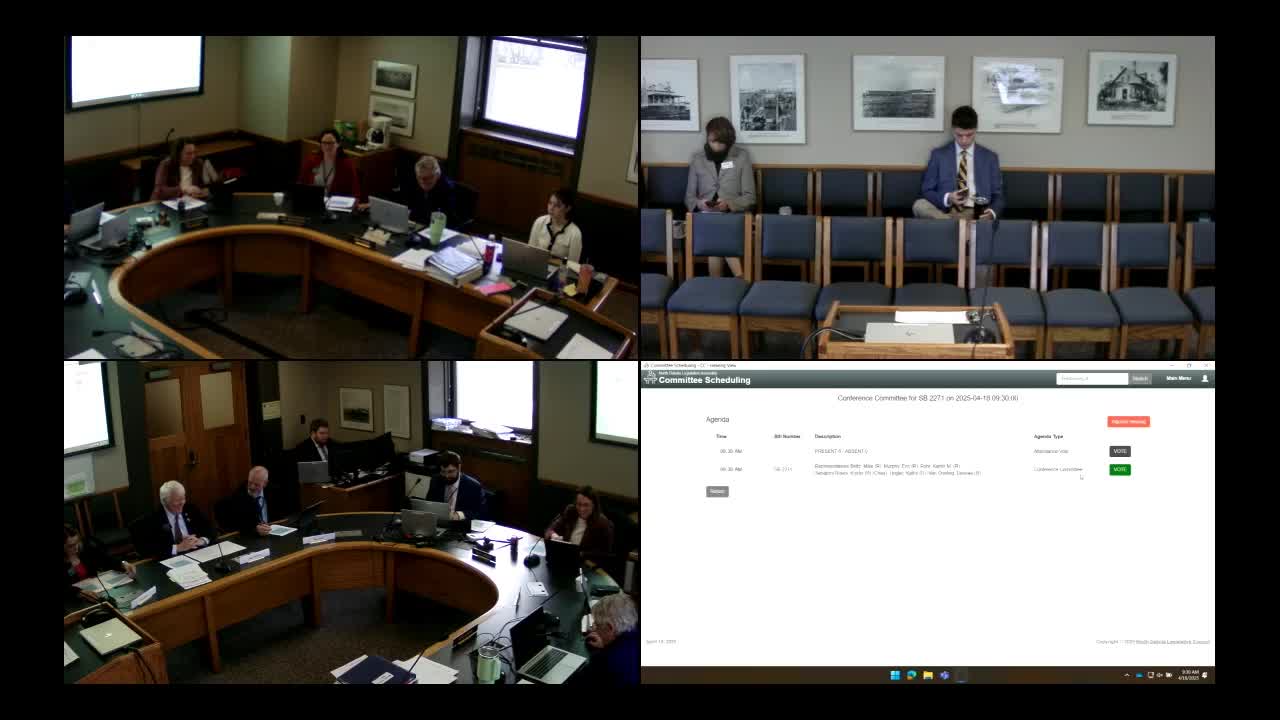Conference committee narrows licensing language, directs HHS and providers to collaborate on adult residential care
Get AI-powered insights, summaries, and transcripts
Subscribe
Summary
A North Dakota legislative conference committee discussed licensure and reimbursement for assisted living, basic care and adult residential facilities and agreed to add collaboration language, remove a requirement for a single-license mandate, and schedule a follow-up conference committee for final drafting.
A North Dakota legislative conference committee on 20-71 met to resolve differences over licensing and reimbursement language for assisted living, basic care and adult residential facilities and agreed to add explicit collaboration with providers while removing a statutory requirement that all those settings be consolidated "under one license."
The committee’s discussion centered on whether the Department of Health and Human Services should be directed to produce a report or study and on how licensing and payment models should be structured to reflect differences in acuity and provider size. Senator Hogan said the department should be delegated to build a model and recommended language that directs HHS to collaborate with providers rather than conducting another legislative study. "This is a really, really important bill," Hogan said, arguing the issue involves framing terminology, standards and payment rates.
The chair and several members pressed for clearer collaboration language and for flexibility on licensure. Nikki Wagner, president of the North Dakota Long Term Care Association, told the committee the association was concerned that the draft language "doesn't identify the department working with the providers to make these recommendations" and urged restoration of explicit provider collaboration. Sarah Aker, Executive Director for the Division of Medical Services at the North Dakota Department of Health and Human Services, said collaboration is already standard practice and described HHS efforts to convene stakeholders: "It's always our process to collaborate with providers...we'd like to do as we develop a new rate structure and a new licensing structure is streamline it for facilities to make it easier to have one license and operate, and meet the needs of multiple individuals."
Committee members discussed alternatives to a single-license approach, including tiered or multiple licenses. Several members noted other states use three- or four-tier systems and warned that overly broad direction could either dilute focus or run out of time to reach usable recommendations. Representative Murphy and others emphasized the need to account for different populations served in these settings — including people with dementia and traumatic brain injury — and to ensure the payment model recognizes varying levels of care and cost. Aker explained current payment practice: providers submit a budget to the department, the department determines a rate, providers receive a provider inflator and many providers feel their costs are not fully recognized. Long-term care advocates asked for a cost-report–based mechanism to recalibrate rates; Aker confirmed rate-setting and rebasing issues were part of prior work, including a rebasing in 2019.
After extended discussion, the committee agreed to include explicit language directing the Department of Health and Human Services to collaborate with providers and other key stakeholders, to remove the phrase "under one license" so the statutory direction would read more broadly as a "new licensing structure," and to leave details such as acuity-based tiers to be developed by the agency and providers. Senator Hogan agreed to work on revising the draft language; the chair said a further conference committee would be scheduled to consider the cleaned-up text.
No formal roll-call votes on amendments or final language were recorded in the transcript; the committee recorded the agreement as committee direction and set further drafting work as the next step.
